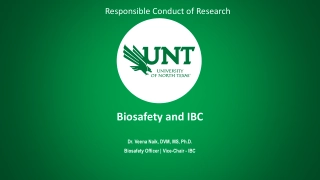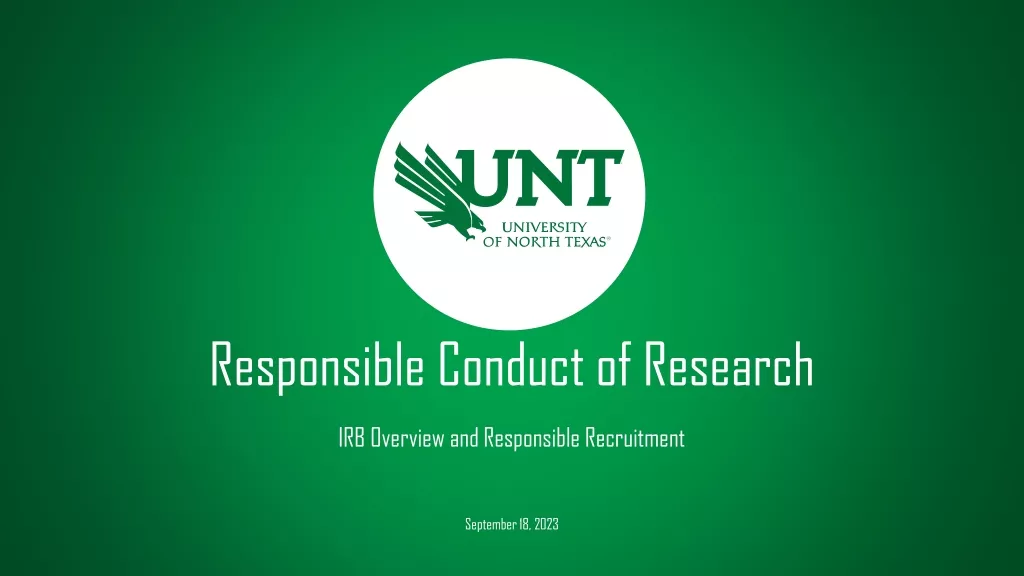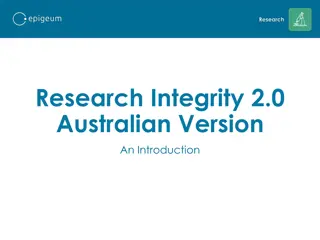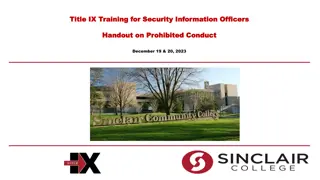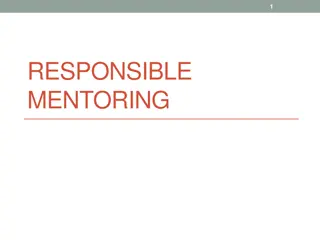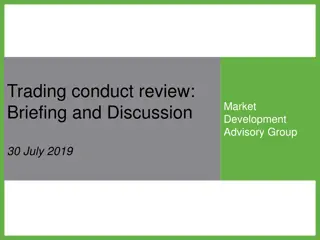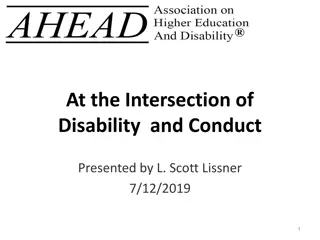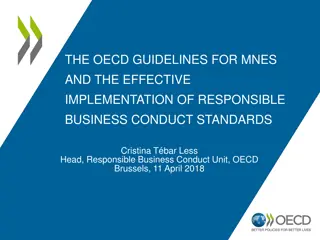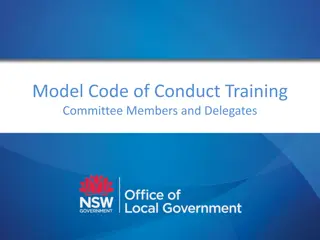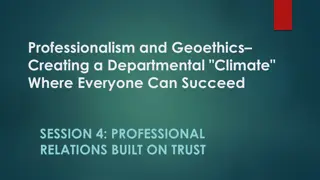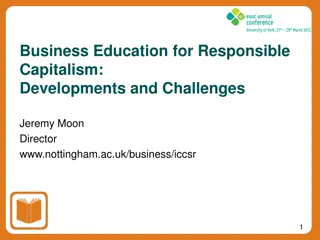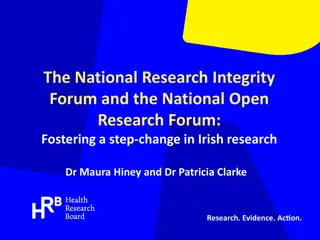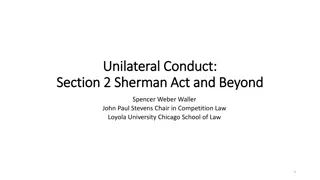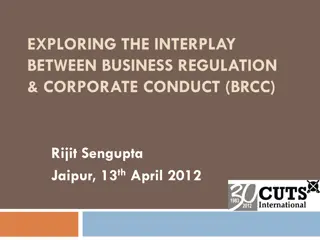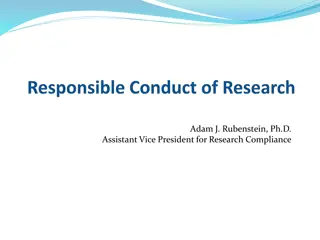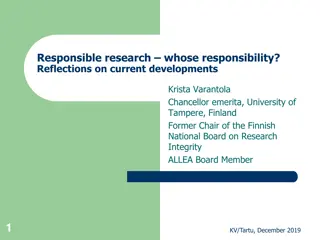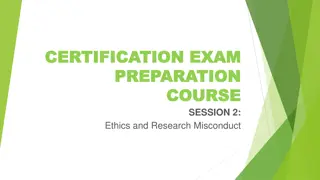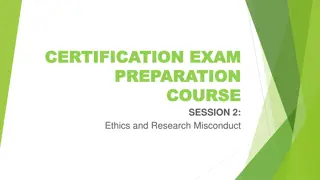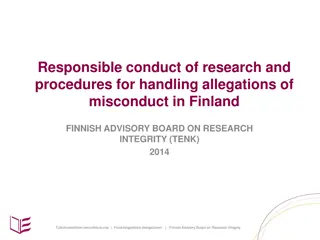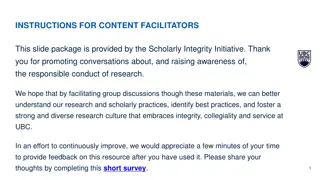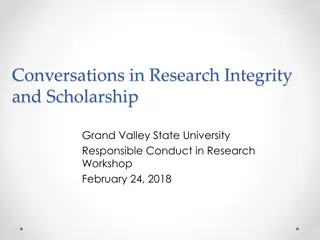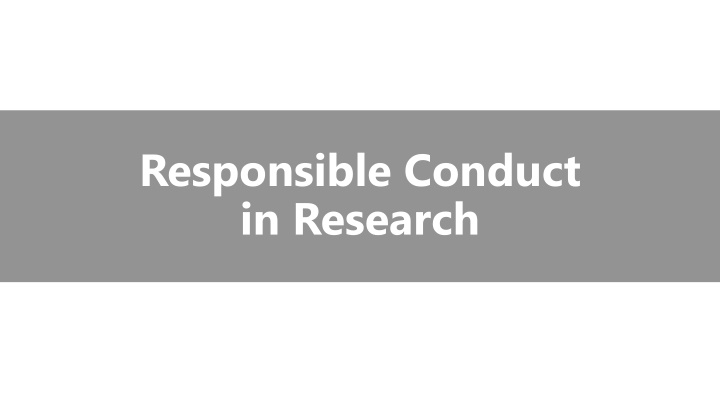
Ethical Considerations in Research: Importance and Impact
Explore the crucial topic of responsible conduct in research, highlighting real-life cases of academic fraud, the prevalence of unethical practices, and personal experiences in academia. It emphasizes the significance of upholding integrity in research for credibility and societal trust, covering five key ethical categories in research.
Download Presentation

Please find below an Image/Link to download the presentation.
The content on the website is provided AS IS for your information and personal use only. It may not be sold, licensed, or shared on other websites without obtaining consent from the author. If you encounter any issues during the download, it is possible that the publisher has removed the file from their server.
You are allowed to download the files provided on this website for personal or commercial use, subject to the condition that they are used lawfully. All files are the property of their respective owners.
The content on the website is provided AS IS for your information and personal use only. It may not be sold, licensed, or shared on other websites without obtaining consent from the author.
E N D
Presentation Transcript
Responsible Conduct in Research
An Authentic Case Diederik Stapel was a academic star known for his clever research experiments in social psychology. For example, he published a paper in Science showing that a trash-filled environment brings out racist tendencies in individuals. https://www.nytimes.com/2013/04/28/magazine/diederik-stapels-audacious-academic-fraud.html
An Authentic Case Unfortunately, the researcher admitted he not only fabricated the data, but he fabricated the entire experiment. And had been doing this for years. https://www.nytimes.com/2013/04/28/magazine/diederik-stapels-audacious-academic-fraud.html
The do more mindset This creates temptations to cut corners, bend the rules, and engage in unethical practices
Yes It Happens In a study, Fanelli (2009) found that: 2% of researchers admitted to falsifying or fabricating data 34% reported engaging in other forms of questionable practices 14% reported having witnessed colleagues manipulating data Daniele Fanelli. How Many Scientists Fabricate and Falsify Research? A Systematic Review and Meta- Analysis of Survey Data. PLoS ONE 4(5): e5738. https://doi.org/10.1371/journal.pone.0005738
A Few Personal Experiences As a reviewer, I have discovered parallel submissions and re- submission of already published content As a conference chair, I have discovered multiple authors being added to papers after acceptance As an advisor, I have counseled students not to remove data for the sole reason it would allow for a statistical effect in the results
Your Conduct Matters Your career and your conscience Others act based on the results of your research Society needs to find science credible You must model the behavior expected from those around you
Five categories of ethical considerations Integrity of research results Publication and authorship Peer review Mentoring Human subjects
Integrity of Research Results Do not fabricate or falsify your data, analyses, or reporting.
Discussion 1. What are some ethical considerations for collecting user- generated data from online platforms (i.e., scraping data)? 2. What are best practices for processing and storing the data?
Best Practices Respect platform s Terms of Service and have min. footprint Maintain the raw data, record when it was collected and how, record all operations, and report all operations in a paper Always get IRB approval Easier: anonymized public data Harder: if you need to create an account, the data includes identifiers, or the content covers a sensitive topic Data cleansing is appropriate before studying the results Consider open sharing of your data Encrypt the data, store securely, and destroy per IRB guidelines
Peer Review When a paper or proposal is submitted, it will receive external reviews. Almost always single blind, and often double-blind. The discussion questions refer to your role as a reviewer.
Peer Review Discussion 1. What are some ethical considerations when deciding whether to agree to or decline a review request? 2. What are some ethical considerations when writing a review?
Peer Review Best Practices If you submit, you should review (and follow through) Provide a fair and constructive assessment Only take on papers for which you have expertise Do not try and gain unfair advantage, but it is acceptable to learn from the review process Be open and honest about possible conflicts of interest Do not force authors to reference your own work over other more relevant work on the topic
Authorship Refers to the names associated with the development of the work and its reporting in a paper
Authorship Discussion 1. When it is appropriate to include someone as an author? What criteria should be used to decide?
Authorship Best Practices Discuss authorship at the onset of a project Only include people as authors for which you can articulate a meaningful contribution to the work or its presentation
Mentorship Refers to the mentor (advisor) / mentee (student) relationship
Mentorship What are at least two issues that could arise between a graduate student and his or her research advisor?
Mentorship Best Practices Discuss expectations early, write them down, and share Keep a record of electronic communications (don t delete email) Never assume
General Discussion We only discussed a fraction of the issues Honest mistakes / differences of opinion are not unethical If in doubt, talk with your advisor or trusted peers
In Conclusion Your conduct and perceptions of your conduct matters Hold yourself to expected standards for research integrity, peer review, authorship, and mentoring relationships Submit certificate of completion for IRB training for next time
Your Assignment Complete the IRB training through CITI. It satisfies the RCR requirements for campus and all NSF-sponsored research. Valid for 3 years, then renew Submit certificate of completion via Compass to show you did it. See the related assignment on the course site Note that NIH requires additional in-person training
Resources Scientific Ethics lecture by L. Cooper and C. Elliott in Physics, the Book On Being a Scientist (2009), and my own experience

